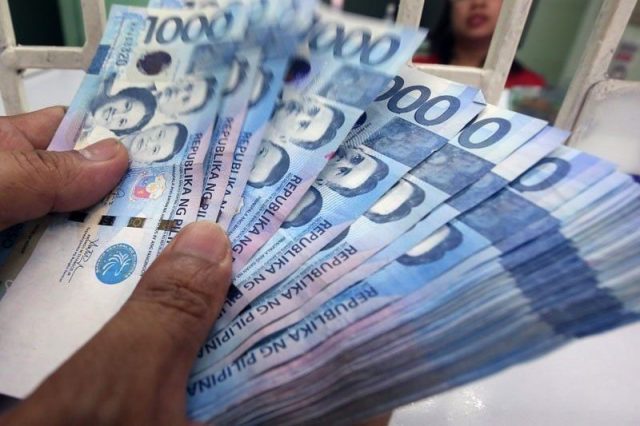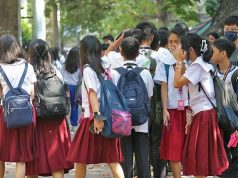The restoration of a department’s confidential funds, the proposed budget of the anti-communist insurgency task force and the planned sovereign wealth fund reminded Filipinos of a longtime tourism slogan.
On Monday, reports said the bicameral conference committee approved the proposed P5.268-trillion national budget for next year, which will undergo ratification on the same day.
The P150-million confidential fund of the Department of Education and the P10-billion funding for the National Task Force to End Local Communist Armed Conflict (NTF-ELCAC) were also restored in the proposed budget.
The bicameral conference committee comprises representatives from the upper and lower chambers of Congress.
NTF-ELCAC
The proposed funding of NTF-ELCAC — notorious for red-tagging critics, activists and progressive groups — was initially P10 billion, but it had been reduced to P5 billion in plenary debates.
Reports said that only 2% of its projects for 2022 have been completed or ongoing. The agency also completed less than half of its projects under its so-called Support for Barangay Development Program for 2021.
Rep. Zaldy Co (Ako-Bicol Party-list) previously said that the House bicameral panel restored the NTF-ELCAC’s budget as instructed by House Speaker Martin Romualdez and Deputy Senior Majority Leader Sandro Marcos.
The agency was created under the Duterte administration and was accused by the rights group Karapatan of being the government’s vehicle to “wage a war targeting human rights defenders, journalists, critics, and anyone who stands in the way of Duterte’s de facto martial law” before.
Co previously said that the NTF-ELCAC has an “important role” in helping “end the country’s decades-long insurgency.”
DepEd
With the reconciled version of the proposed 2023 national budget, the P150-million confidential funds of DepEd were also restored.
The Senate previously reduced the confidential funds to P30 million under the proposal of opposition Sen. Risa Hontiveros who wanted it realigned for the department’s Healthy Learning Institutions Program.
The program aims to strengthen health and nutrition programs in the basic education sector with the help of various stakeholders.
DepEd had sought a P150-million confidential funds to deal with the “threats to the learning environment, safety, and security of DepEd personnel” which it said “are interlocking with the mandate of support to the national security of civilian offices.”
The agency cited that issues such as sexual abuse, recruitment to insurgency, child labor and gangsterism, among others, need “the support of surveillance and intelligence gathering” for the office to ensure it has target-specific projects that will result in “broader protection” of its personnel and learners.
“That’s the decision of the House… na ituloy no, because mahirap, mga kabataan natin nare-recruit sa maling papuntang landas,” Co said on Monday.
Budget documents from 2016 to 2022 do not show such type of funding being allocated to the DepEd before.
Confidential funds are for confidential expenses related to surveillance activities in civilian government agencies that are intended to support their mandate or operations.
Similarly, intelligence funds are for intelligence expenses related to information-gathering activities of uniformed and military personnel and intelligence practitioners that have a direct impact on national security.
Maharlika Investment Fund
The sovereign wealth fund, filed as House Bill No. 6398, seeks to generate government revenue through investments in real and financial assets.
It is a state-owned investment fund typically financed by a country’s surplus revenues or reserves.
Governments invest these funds with the aim to stabilize national budgets, create savings for their citizens or promote economic development.
ALSO READ: What is ‘Maharlika Investment Fund’ bill?
In the Philippines’ version, an initial investment of P250 billion would be sourced from the Government Service Insurance (P125 billion), Social Security System (P50 billion), Land Bank of the Philippines (P50 billion) and the Development Bank of the Philippines (P25 billion).
The bill also requires the annual contributions of the Bangko Sentral ng Pilipinas, Philippine Amusement and Gaming Corp, the General Appropriations Act or Supplemental Appropriations and other sources which include special assessments on natural resources and public borrowing, among others.
The national government also needs to contribute an initial P250 billion to the proposed sovereign wealth fund.
The bill was met with concern by BSP Governor Felipe Medalla, presidential sister Sen. Imee Marcos, Foundation for Economic Freedom president Calixto Chikiamco and other economists and business groups like the Financial Executives Institute of the Philippines, Makati Business Club, Competitive Currency Forum and Institute of Corporate Directors, among others.
“There is at present no gap nor ‘missing institution’ in the economy that needs to be solved by the creation of an SWF. The country does not have a bonanza of commodity surpluses that need to be deployed,” they said.
“Instead of leaving a legacy of surplus funds to be managed for future generations, the current generation is leaving a legacy of heavy indebtedness which future generations need to pay or refinance,” they continued.
GSIS president and general manager Wick Veloso assured the public that the bill has safeguard mechanisms.
“Dito po sa ating ginagawa, maraming layers of transparency. May internal auditor, may board of directors, may independent participants from private sector,” he said on Monday.
Veloso added that the Philippine Stock Exchange and the Bankers’ Association of the Philippines will sit as independent directors.
Tourism slogan
The reports and developments about such funds prompted some Filipinos to recall the longtime tourism slogan, “It’s More Fun in the Philippines,” and modify it in response to the initiatives.
“True to word, [it’s] more funds in the Philippines,” market analyst John Paul Tanyag commented amid the reports.
“May confidential at intel funds na, may Maharlika Funds pa???? It’s more funds in the Philippines,” another Pinoy tweeted.
A Facebook user quoted a news report and then shared a comment.
“‘The bill proposes an initial investment of P250 billion from the four government financial institutions (GFIs), with the breakdown as follows: GSIS, P125 billion; SSS, P50 billion; Land Bank: P50 billion, and DBP: P25 billion,'” he quoted.
“#ItsMoreFUNDSinThePhilippines,” the user added.
“Confidential fund. Intelligence fund. Maharlika fund. It’s more funds in the Philippines,” digital creator Arius Ingua wrote on his page.
“It’s More Fun in the Philippines” is a tourism campaign of the country used as a slogan beginning in 2012, replacing the “WOW Philippines” tagline.
It was launched under late tourism chief Ramon Jimenez Jr as an answer to the question, “Why should I go to the Philippines?”
The slogan is credited to David Guerrero, chairman and chief creative officer of BBDO Guerrero, the advertising agency behind some of the world’s most iconic brands like Pfizer, Pedigree, Frito Lay and Pepsi.
He said the idea came during a diving trip, where he realized “how much more fun it is to be doing the same thing here than in another country.”
The country’s tourism slogan was briefly changed to “Experience Philippines” from 2017 to 2019.
The “It’s More Fun in the Philippines” was relaunched in 2019 and has since been the flagship tourism tagline.










